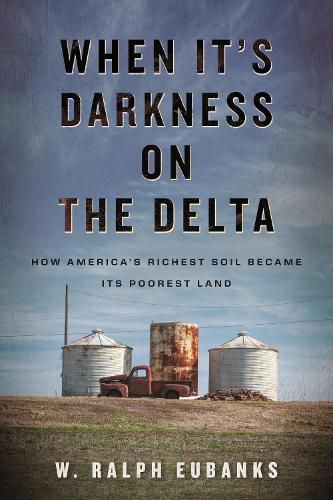Readings Newsletter
Become a Readings Member to make your shopping experience even easier.
Sign in or sign up for free!
You’re not far away from qualifying for FREE standard shipping within Australia
You’ve qualified for FREE standard shipping within Australia
The cart is loading…






For readers of The Sum of Us and South to America, an essential new look at the roots of American inequality-and the seeds of its transformation
For readers of The Sum of Us and South to America, an essential new look at the roots of American inequality-and the seeds of its transformation
Once the powerhouse of a fledgling country's economy, the Mississippi Delta has been consigned to a narrative of destitution. It is often faulted for the sins of the South, portrayed as a regional backwater that willfully cleaved itself from the modern world. But buried beneath the weight of good ol' boy politics and white-washed histories lies the Delta's true story.
Mississippi native and award-winning writer W. Ralph Eubanks unearths the region's buried history, revealing a microcosm of economic oppression in the US. He traverses the Delta, examining its bellwether efforts to combat income inequality through vivid portraits of key figures like
Theodore G. Bilbo and William Whittington, segregationist congressmen who sabotaged federal reparations for former sharecroppers in the 1940s and '50s Gloria Carter Dickerson, founder of the Emmett Till Academy, whose parents were instrumental in desegregating schools in Drew, MS, where Till was murdered Calvin Head, a community organizer who runs a farming co-op in Mileston, who revived the legacy of his hometown, the only Black resettlement community in Mississippi
Eubanks delivers a powerful and insightful examination of how racism and economic instability have shaped life in the Mississippi Delta. He traces the enduring consequences of political decisions that have entrenched inequality across generations. At the same time, he brings attention to the resilience of local communities and the grassroots movements working toward meaningful change. The book offers a thoughtful framework for policy reform and community investment, underscoring the need to support those who have long sustained the region through their labor and lived experience.
$9.00 standard shipping within Australia
FREE standard shipping within Australia for orders over $100.00
Express & International shipping calculated at checkout
Stock availability can be subject to change without notice. We recommend calling the shop or contacting our online team to check availability of low stock items. Please see our Shopping Online page for more details.
For readers of The Sum of Us and South to America, an essential new look at the roots of American inequality-and the seeds of its transformation
For readers of The Sum of Us and South to America, an essential new look at the roots of American inequality-and the seeds of its transformation
Once the powerhouse of a fledgling country's economy, the Mississippi Delta has been consigned to a narrative of destitution. It is often faulted for the sins of the South, portrayed as a regional backwater that willfully cleaved itself from the modern world. But buried beneath the weight of good ol' boy politics and white-washed histories lies the Delta's true story.
Mississippi native and award-winning writer W. Ralph Eubanks unearths the region's buried history, revealing a microcosm of economic oppression in the US. He traverses the Delta, examining its bellwether efforts to combat income inequality through vivid portraits of key figures like
Theodore G. Bilbo and William Whittington, segregationist congressmen who sabotaged federal reparations for former sharecroppers in the 1940s and '50s Gloria Carter Dickerson, founder of the Emmett Till Academy, whose parents were instrumental in desegregating schools in Drew, MS, where Till was murdered Calvin Head, a community organizer who runs a farming co-op in Mileston, who revived the legacy of his hometown, the only Black resettlement community in Mississippi
Eubanks delivers a powerful and insightful examination of how racism and economic instability have shaped life in the Mississippi Delta. He traces the enduring consequences of political decisions that have entrenched inequality across generations. At the same time, he brings attention to the resilience of local communities and the grassroots movements working toward meaningful change. The book offers a thoughtful framework for policy reform and community investment, underscoring the need to support those who have long sustained the region through their labor and lived experience.